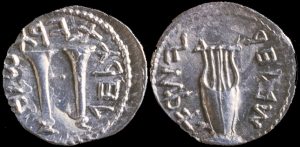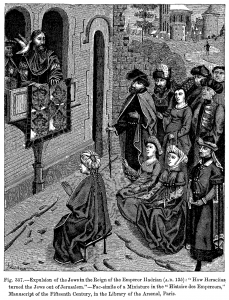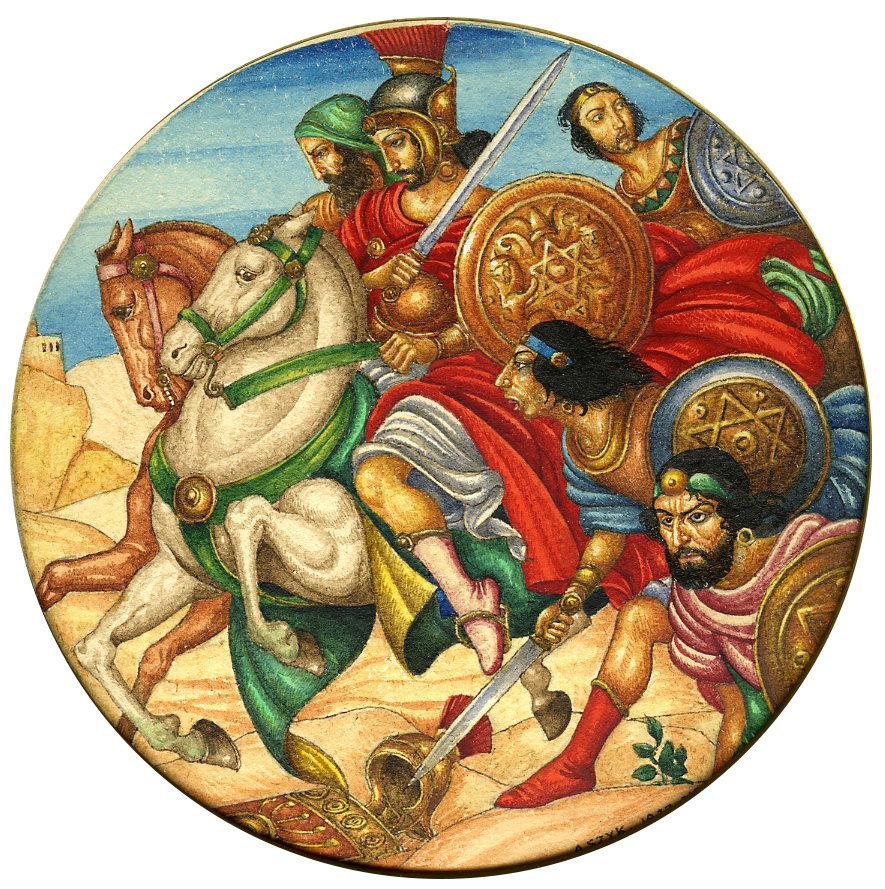
130 AD to 150 AD, Psalm 54: Bar Kokhba.
This site was first built in French (see www.147thgeneration.net). The English translation was mainly done using « google translation ». We have tried to correct the result of this translation to avoid interpretation errors. However, it is likely that there are unsatisfactory translations, do not hesitate to communicate them to us for correction.
(for that click on this paragraph)
Summary
This generation is from the years 130 AD to 150 AD.
According to our count, this generation is the 54th generation associated with Psalm 54. It is in this Psalm 54 that we therefore find an illustration of the facts of this generation.
This generation is the one of all dangers for the Jewish people. After the Jewish diaspora let itself be led to revolt under Hadrian to the previous generation, this time it is Judea that the revolt is booming. It is the theater of the second war of the Jews without this time of Flavius Josephus to serve the historians.
Most historians agree that the revolt arose out of the decision to challenge prominent religious symbols of Judaism, such as the ban on circumcision.
Bar Kokhba, son of the star for his followers, or son of the lie (Bar Koziba) for his detractors, manages to stand up in Rome for at least two years, during which he strikes currency and behaves as a monarch on Judea. Many follow him either by faith or fear.
But the adventure ends, Rome makes the necessary effort to defeat the army of Bar Kokheba, presumably with great difficulties and without mercy for the vanquished.
Talk
Hadrian
At the level of the Roman Empire, Hadrian continues his reign (117/138), following that of Antoninus Pius (138/161).
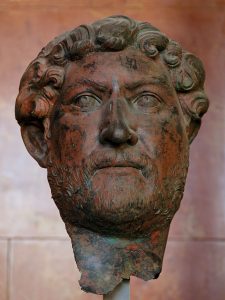
This generation is the one of all dangers for the Jewish people. After the Jewish diaspora let itself be led to revolt under Hadrian to the previous generation, this time it is Judea that the revolt is booming. It is the theater of the second war of the Jews without this time of Flavius Josephus to serve the historians.
This generation is that of the revolt of Bar Kokhba (132 / beginning of the revolt, 135 / Fall of Bethar) which leads the Jewish people to a new defeat against Rome which could well have meant the end of the Jewish people. But the Jewish people continued to survive and cross the centuries.
It is in this context that we must understand the title of this psalm.

- For the conductor, on neginoth, a maskil of David.
- When the Ziphim came and said to Saul, « Is not David hiding with us? »
Without hope of winning
Indeed the event he recalls sees David confronting himself again with his enemy and ally of always: King Saul. Just as in the present generation, the Jewish people must face once again Rome, her hereditary enemy but also the brotherly people. This is how the danger to David is announced:
- And [1] the Ziphites came to Saul, to Gibeah, saying, « Is not David hiding in the Hill of Hachilah, before the Desolate Wasteland? »
- And Saul arose and descended to the Desert of Ziph, and with him were three thousand picked men, to seek David in the Desert of Ziph.
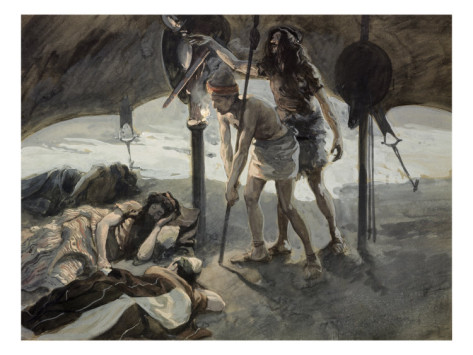
David then took the initiative of the battle by himself going to Saul’s camp to steal his spear and a water jug, contenting himself with his objects when he had the possibility of killing Saul. With that, David was able to confront Saul:
- And now [2], see (– David addresses Abner whose mission was to watch over Saul –) where the king’s spear is, and the jug of water which was at his head. »
- And Saul recognized David’s voice, and said, « Is this your voice, my son David, » And David said, « (It is) my voice, my lord, O king. »
- And he said, « Why does my lord pursue his servant? for what have I done? and what evil is in my hand?
- And now, let now my lord the king hear his servant’s words. If the Lord has incited you against me, He will accept an offering; but if the sons of men, cursed be they before the Lord, for they have driven me today from cleaving to the Lord’s heritage, saying, ‘Go, worship other gods.’
- And now, let not my blood fall to the ground away from the face of the Lord, for the king of Israel has gone out to seek a flea as the partridge hunts in the mountains. »
- And Saul said, « I have sinned. Return, my son David, for I shall harm you no more, because my life was precious in your eyes this day. Behold, I have acted foolishly and have erred exceedingly. »
- And David answered and said, « Behold the king’s spear. Now let one of the youths come over and take it.
- And the Lord will repay every man for his righteousness and his faithfulness, for the Lord delivered you today into my hand, and I would not stretch forth my hand against the Lord’s anointed.
- And behold, as your life was precious this day in my eyes, so shall my life be precious in the eyes of the Lord, and He shall save me from every distress. »
- And Saul said to David, « Blessed be you, my son David. You shall both do (great things) and you shall prevail. » And David went on his way, and Saul returned to his place.
Like David with Saul, the Jewish people must endure Rome without any hope or real will to overcome it. As David became king when Saul perished because God had abandoned him, the Jewish people will regain their supremacy once God has decided to close the power of Rome.

In the generation that interests us, the Jewish people are once again fighting Rome, but not in a hope to bring down that power, but simply to try to safeguard the sanctity of Jerusalem.
If the Roman repression was harsh and the Jewish people paid dearly for its resistance, its unity was consolidated and paradoxically, while having lost this new war against the Romans, the Jewish people came out stronger even if many Jews perished.
This allows the parallel with the episode of David confronted with Saul, who also did not inflict a defeat on Saul but grew out of the confrontation. Thus the blessing of Saul applies with all the more acuteness to the generation that interests us who did not hesitate to « undertake » a fight lost in advance against Rome but without which the Jewish people instead of disappearing physically would have disappeared as a people.
The values of Judaism
Indeed, even if we do not have many elements to relate this war, its causes and its consequences, most historians agree that the revolt was born after the decision to call into question preponderant religious symbols. of Judaism:
- The [3] problematic (to explain the reason for the revolt) is thus reduced to the prohibition of circumcision and the building of Aelia Capitolina (on the site of Jerusalem), and the majority of the scientists hold these two simultaneous reasons for the causes of the war.
Bar Kokhba, son of the star for his followers, or son of the lie (Bar Koziba) for his detractors, manages to stand up in Rome for at least two years, during which he strikes currency and behaves as a monarch on Judea.
Many follow him either by faith or fear.
.By faith, because many saw in him the long-awaited messiah, like the respectable Rabbi Akiba, whose talmud reminds us of this « misguidance »:
- Rabbi [4] Simeon Bar Yohai taught: « My master Aqiba interpreted (the verse of the Bible) ‘A star has gone forth from Jacob (Bamidbar – Numbers – Chapter24, verse 17)’ (as follows): Koziba will come out of Jacob! Indeed, Rabbi Aqiba said, on seeing Bar Koziba, « Here is the Messiah King! Then Rabbi Yohanan ben Torta said to him: « Aqiba, the grass will have grown between the jaws before the son of David appears! «
The defeat
But the adventure ends, Rome makes the necessary effort to defeat the army of Bar Kokheba, presumably with great difficulties and without mercy for the vanquished:
- When [5] other details about the course of the war, they are also very meager. We know the name of governor of the province of Judea at the beginning of the revolt – Tineius Rufus – and we know that the Romans did not succeed in stemming the uprising with great difficulty. The proof is that several legions were engaged in the fight against the insurgents: legion III Cyrenaica undoubtedly, legio III Gallica, legio X Fretensis, legio VI Ferrata and many auxiliary troops; the legio X Fretensis and also probably the legio VI Ferrata were the two garrisons stationed in Judea at the beginning of the war. Not only did the governor of Syria, Publicus Marcellus, intervene, but Hadrian transferred his best general, Julius Severus, from Brittany to Palestine and entrusted him with the high command of the Roman troops.
- « They (the Romans) slaughtered so many Jews that the horses plunged into the blood to the nostrils. And the blood raised up quarters of rocks weighing forty seah and rolled them to the sea …
- It was said that the brains of three hundred little children were found on a stone. [Likewise] three baskets filled with phylacteries [of a capacity of] nine seah were found. Some said: nine [baskets of a capacity of] three seah. […] »
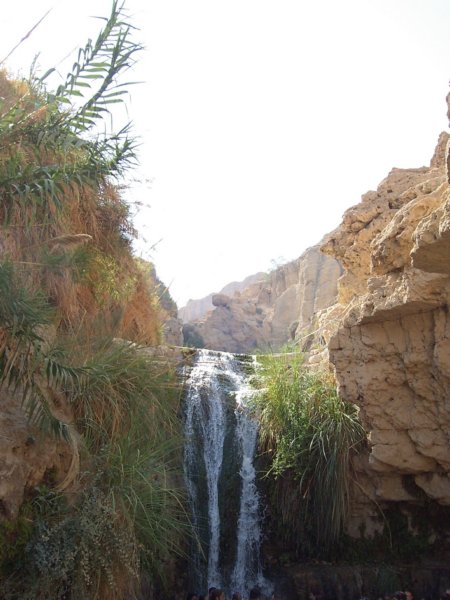
- Documents found in the Judean Desert (primarily in Nahal Heber, south of En-Guedi) refer to the last phase of the war. The last insurgents who had taken refuge in the En-Gedi caves were starving until the Romans could kill them, according to the tactics already successfully employed by Herod.
All this revolt is evoked in the psalm of this generation:

- O God, with Your name save me, and with Your might avenge me.
- O God, hearken to my prayer, incline Your ear to the words of my mouth.
- For strangers rose upon me and violent men sought my soul; they did not place God before them forever.
- In seeking to rebuild Jerusalem as a pagan city or prohibiting circumcision, Rome was directly attacking God by flouting the sanctity of his city and despising the covenant established with the people of Israel. The Jewish people defending these values faced a fierce army that threatened the people of God to the point of extinction.
- Behold, God is my Helper; the Lord is [help] to those who support my soul.
- He will return the evil to those who lie in wait for me; cut them off with Your truth.
- With generosity, I will slaughter sacrifices to You; I will thank Your name, O Lord, because it is good.
- For He saved me from every distress, and my eye saw my enemies.
- From this great threat, which will be terrible on the human plane, the Jewish people will come out stronger and more united, keeping their fidelity and trust in their God. God who at the end of the night will trip Rome to allow the Jewish people to settle again in the land of Israel and Jerusalem, a city for which the chosen people has sacrificed a new faith in this generation.

[1] Shmuel I – I Samuel – Chapter 26, verses 1 and 2
[2] Shmuel I – I Samuel – Chapter 26, verses 16 to 25
[3] Peter Schäfer: « History of the Jews in Antiquity » / Chapter: « The Bar Kokheba Uprising. (French: « Histoire des Juifs dans l’antiquité »/Chapitre : « Le soulèvement de Bar Kokheba » (P172/173/174) ).
[4] Jerusalem Talmud quoted by Peter Schäfer in « History of the Jews in Antiquity », chapter « Bar Kokheba Uprising » (French: « Histoire des Juifs dans l’antiquité », chapitre « le soulèvement de Bar Kokheba (p. 176) ).
[5] Peter Schäfer: « History of the Jews in Antiquity » / Chapter: « The Bar Kokheba Uprising. (French: « Histoire des Juifs dans l’antiquité »/Chapitre : « Le soulèvement de Bar Kokheba » (P185/186) ).

